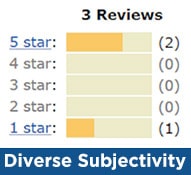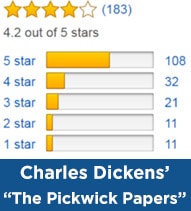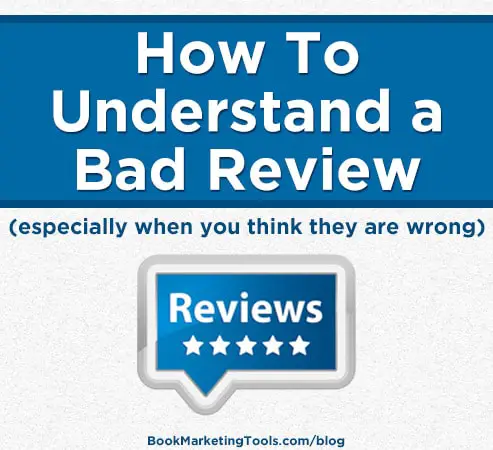This is a guest post from author David K. Roberts. We all know how important reviews are. We can work hard to get reviews for our books, but then that dreaded bad review eventually comes in. “The injustice! They must be wrong! What were they thinking?”
Here are some insights into bad reviews that can give you some understanding and maybe even help you grow as a writer.
Bad Reviews
There is nothing worse than a one star review. Everyone gets at least one and they irritate like a splinter under your skin. Getting them removed is rarely an option, after all a review is a review.
So, with all that time and effort of writing now condensed into one excellent book, at least in your opinion, what went wrong?
There are four possible answers to this question and in every case they require you to grow as a person and as a writer.
Point 1: The Review Was Incorrect Or Inaccurate
I believe this point is often connected to the price at which the book was sold. Selling your book for 99 cents or giving it away for free is a topic for another day, but many have discovered from personal experience that there is a direct correlation between criticism and the price of the book. First of all, if you’re prepared to give your book away for free or cheaply, then people tend not to respect that, often seeing it as a reflection of your abilities. Remember that people are fickle and rarely appreciate being given something for nothing.
Point 2: The Reader Didn’t Understand The Book

In this day and age, with relatively cheap ebooks available to a much wider audience, there will be a significant variance of intellect and life experience among your readers. I’m not being an intellectual snob when I say this but the reality remains that people will always interpret what you have written in many different ways; with a broader readership this will be amplified. Perhaps your book is available to a readership that is too young or too old to appreciate what you are saying. It is possible on most ebook marketplaces to narrow the field of your readership; the nature of the reviews will indicate if this is something that needs investigation.
Point 3: The Review Is Malicious Or The Reviewer Has A Hidden Agenda
For my sins I write zombie horror books as part of what I do. This is a very broad readership genre and caters for all ages. I received a review recently that accused me of plagiarizing World War Z. It was a strange accusation as at that point I had neither seen the film nor read the book. The fact that it had an airplane ride, a crash landing, and zombies, which seemed to be all that this person needed in order to make the accusation. To see what she was talking about I even made a point of watching the film to see whether her critique had wings. Luckily it did not. I suspect her rather accusatory review had more to do with her favorites in the genre – hence her personal agenda. It is also possible that she didn’t even finish reading it. Many genres have a very opinionated readership that won’t easily accept new ideas. As a corollary to this thought, be aware that if you sell your books cheaply or give them away, they become a target for a whole underworld of readers prepared to read only free books, and yet strangely (or maybe not) they tend also to be the most vocal and vicious in their criticism. They are a group of people to whom destruction comes more easily than creation. Just remember that hidden agendas are everywhere.
Point 4: The Review Has Merit
This is possibly the hardest reality to accept – that the reviewer is at least partly right. As an author it is crucial to your success that you have an open mind. As part of the writing process, it is very important to be as complete and accurate as you can be; use the tools provided in your word processor because there is no longer any excuse for grammar or spelling errors – the simple reality is that no matter how good your story is, it has to be readable. For the best results it is a good idea to find a professional editor; they are relatively inexpensive and will be able to advise you not only on spelling and grammar but make suggestions where there might be run-on sentences and other mechanisms that make it difficult for the reader to appreciate the story.
It takes a lot of courage to write a book, pouring your heart onto every page in one form or another, and then publish it for everyone to see. The last thing you want is a bad review, but accepting that the person might just be right is part of the growing process you undergo as an author. My first bad review criticized my editing; as a result I reviewed my manuscript and found that there was at least some justification in what he said if not in how he said it.
Responding To Bad Reviews
For all reviews on publishing sites it is possible for the author to respond. Be careful taking this route as it can lead to a worse situation than if you had ignored it. By all means, do not take criticism lying down, but be measured and courteous in your response. That will go a long way towards making the reviewer’s opinion look simply spurious rather than accurate. You could also consider not responding at all. Reviewers often say that they don’t read previous reviews before reading a book because apart from the odd spoiler, it can colour their appreciation positively or negatively, and enjoying a book is entirely subjective.
Finally, grow a thicker skin. It doesn’t matter whether you’re writing your first or your 50th book, a bad review still hurts. Look up any of your favorite, famous authors and check out their reviews. Go to a book you really like and read the one and two star reviews. It may not make you feel better when you get a bad review but at least you’ll know you’re in good company.
David K. Roberts is an author of horror books and likes to help authors.

